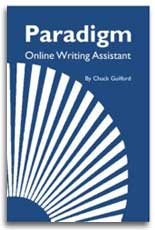Everyone has an individual style, not only professional writers. We all—the Hell's Angel in denim and leathers, the banker in pinstripes and bifocals—reveal our personalities and values in our appearance, in our possessions, and in our language.
Do you have a sense of humor? Is it biting and sarcastic or lighthearted and jolly? Are you direct and blunt? Or do you like to hint and suggest what's on your mind? Do you get emotionally involved or stay coolly detached? Are you casual or formal? Confident or insecure? What part of the country do you come from? How much education do you have? By studying a few pages of your writing, a perceptive reader should be able to form a fairly accurate impression of you as a person. Style refers to the way you, the person behind the writing, come across to your readers; more precisely, it refers to the elements of your writing that mark it as being uniquely yours.
Stylistic awareness helps you gauge the impression your words will make on others.
If you think about it, you'll probably find that sometimes when reading you've had strong feelings about the personality behind the writing. Letters from friends or relatives, for instance, are often valued less for their news (Uncle Henry got a new toupee, or your little sister lost her second tooth)than for the individual voice that comes across, the familiar expressions and ways of thinking, the tone of friendliness and caring. Or maybe you know a qualified person who was passed over for a job interview because the selection committee thought the candidate's letter of application sounded "too arrogant and condescending" or "too desperate and insecure."
Such impressions are often subliminal. That is, we may not be fully aware of our feelings, and we might not be able to say exactly what features of the language are responsible. Style is subtle, perhaps more so in writing than in other areas of life. Still, developing your individual writing style is essential, not just because style is an expression of your self, but because stylistic awareness helps you gauge the impression your words will make on others.




